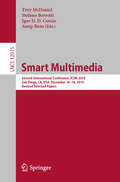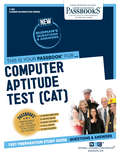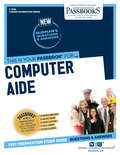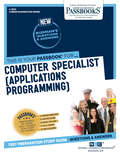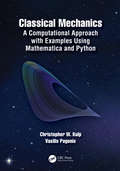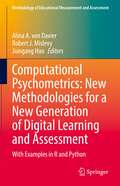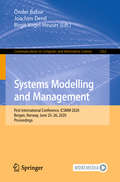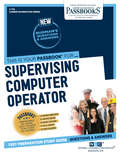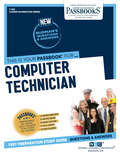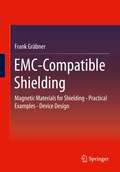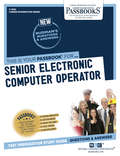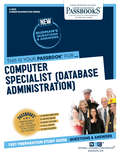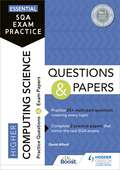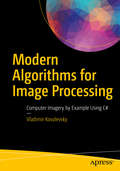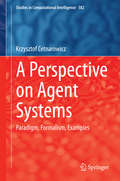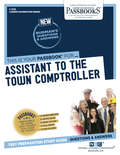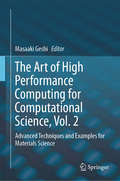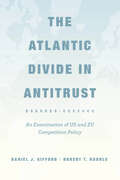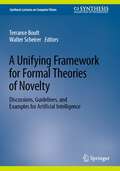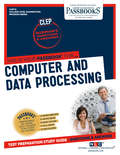Special Collections
Competitive Exam
- Table View
- List View
Smart Multimedia
by Stefano Berretti and Anup Basu and Troy McDaniel and Igor D. D. CurcioThis book constitutes the proceedings of the Second International Conference on Smart Multimedia, ICSM 2019, which was held in San Diego, CA, USA, in December 2019. The 45 papers presented were selected from about 100 submissions and are grouped in sections on 3D mesh and depth image processing; image understanding; miscellaneous; smart multimedia for citizen-centered smart living; 3D perception and applications; video applications; multimedia in medicine; haptics and applications; smart multimedia beyond the visible spectrum; machine learning for multimedia; image segmentation and processing; biometrics; 3D and image processing; and smart social and connected household products.
Computer Aptitude Test (CAT)
by National Learning CorporationThe Computer Aptitude Test (CAT) Passbook® prepares you for your test by allowing you to take practice exams in the subjects you need to study. It provides hundreds of questions and answers in the areas that will likely be covered on your upcoming exam.
Computer Aide
by National Learning CorporationThe Computer Aide Passbook® prepares you for your test by allowing you to take practice exams in the subjects you need to study. It provides hundreds of questions and answers in the areas that will likely be covered on your upcoming exam, including but not limited to: operating and electronic computer and peripheral equipment attached or communicating with an electronic computer; observing and controlling the operation of computer equipment; clerical abilities; record keeping; understanding and interpreting written material; arithmetic reasoning; and other related areas.
Computer Specialist (Applications Programming)
by National Learning CorporationThe Computer Specialist (Applications Programming) Passbook® prepares you for your test by allowing you to take practice exams in the subjects you need to study. It provides hundreds of questions and answers in the areas that will likely be covered on your upcoming exam, including but not limited to: techniques of supervision and administration in a computer environment; development, installation, management, operation, and maintenance of computer application programs and system development projects; computer terminology; supervision; and other related areas.
Classical Mechanics
by Vasilis Pagonis and Christopher W. KulpClassical Mechanics: A Computational Approach with Examples using Python and Mathematica provides a unique, contemporary introduction to classical mechanics, with a focus on computational methods. In addition to providing clear and thorough coverage of key topics, this textbook includes integrated instructions and treatments of computation. Full of pedagogy, it contains both analytical and computational example problems within the body of each chapter. The example problems teach readers both analytical methods and how to use computer algebra systems and computer programming to solve problems in classical mechanics. End-of-chapter problems allow students to hone their skills in problem solving with and without the use of a computer. The methods presented in this book can then be used by students when solving problems in other fields both within and outside of physics. It is an ideal textbook for undergraduate students in physics, mathematics, and engineering studying classical mechanics. Features: Gives readers the "big picture" of classical mechanics and the importance of computation in the solution of problems in physics Numerous example problems using both analytical and computational methods, as well as explanations as to how and why specific techniques were used Online resources containing specific example codes to help students learn computational methods and write their own algorithms A solutions manual is available via the Routledge Instructor Hub and extra code is available via the Support Material tab
Computational Psychometrics
by Robert J. Mislevy and Alina A. von Davier and Jiangang HaoThis book defines and describes a new discipline, named “computational psychometrics,” from the perspective of new methodologies for handling complex data from digital learning and assessment. The editors and the contributing authors discuss how new technology drastically increases the possibilities for the design and administration of learning and assessment systems, and how doing so significantly increases the variety, velocity, and volume of the resulting data. Then they introduce methods and strategies to address the new challenges, ranging from evidence identification and data modeling to the assessment and prediction of learners’ performance in complex settings, as in collaborative tasks, game/simulation-based tasks, and multimodal learning and assessment tasks.Computational psychometrics has thus been defined as a blend of theory-based psychometrics and data-driven approaches from machine learning, artificial intelligence, and data science. All these together provide a better methodological framework for analysing complex data from digital learning and assessments. The term “computational” has been widely adopted by many other areas, as with computational statistics, computational linguistics, and computational economics. In those contexts, “computational” has a meaning similar to the one proposed in this book: a data-driven and algorithm-focused perspective on foundations and theoretical approaches established previously, now extended and, when necessary, reconceived. This interdisciplinarity is already a proven success in many disciplines, from personalized medicine that uses computational statistics to personalized learning that uses, well, computational psychometrics. We expect that this volume will be of interest not just within but beyond the psychometric community.In this volume, experts in psychometrics, machine learning, artificial intelligence, data science and natural language processing illustrate their work, showing how the interdisciplinary expertise of each researcher blends into a coherent methodological framework to deal with complex data from complex virtual interfaces. In the chapters focusing on methodologies, the authors use real data examples to demonstrate how to implement the new methods in practice. The corresponding programming codes in R and Python have been included as snippets in the book and are also available in fuller form in the GitHub code repository that accompanies the book.
Systems Modelling and Management
by Birgit Vogel-Heuser and Önder Babur and Joachim DenilThis book constitutes the refereed proceedings of the First International Conference on Systems Modelling and Management, ICSMM 2020, planned to be held in Bergen, Norway, in June 2020. Due to the COVID-19 pandemic the conference did not take place physically or virtually. The 10 full papers and 3 short papers were thoroughly reviewed and selected from 19 qualified submissions. The papers are organized according to the following topical sections: verification and validation; applications; methods, techniques and tools.
Supervising Computer Operator
by National Learning CorporationThe Supervising Computer Operator Passbook® prepares you for your test by allowing you to take practice exams in the subjects you need to study. It provides hundreds of questions and answers in the areas that will likely be covered on your upcoming exam.
Computational Psychometrics
by Robert J. Mislevy and Alina A. von Davier and Jiangang HaoThis book defines and describes a new discipline, named “computational psychometrics,” from the perspective of new methodologies for handling complex data from digital learning and assessment. The editors and the contributing authors discuss how new technology drastically increases the possibilities for the design and administration of learning and assessment systems, and how doing so significantly increases the variety, velocity, and volume of the resulting data. Then they introduce methods and strategies to address the new challenges, ranging from evidence identification and data modeling to the assessment and prediction of learners’ performance in complex settings, as in collaborative tasks, game/simulation-based tasks, and multimodal learning and assessment tasks.Computational psychometrics has thus been defined as a blend of theory-based psychometrics and data-driven approaches from machine learning, artificial intelligence, and data science. All these together provide a better methodological framework for analysing complex data from digital learning and assessments. The term “computational” has been widely adopted by many other areas, as with computational statistics, computational linguistics, and computational economics. In those contexts, “computational” has a meaning similar to the one proposed in this book: a data-driven and algorithm-focused perspective on foundations and theoretical approaches established previously, now extended and, when necessary, reconceived. This interdisciplinarity is already a proven success in many disciplines, from personalized medicine that uses computational statistics to personalized learning that uses, well, computational psychometrics. We expect that this volume will be of interest not just within but beyond the psychometric community.In this volume, experts in psychometrics, machine learning, artificial intelligence, data science and natural language processing illustrate their work, showing how the interdisciplinary expertise of each researcher blends into a coherent methodological framework to deal with complex data from complex virtual interfaces. In the chapters focusing on methodologies, the authors use real data examples to demonstrate how to implement the new methods in practice. The corresponding programming codes in R and Python have been included as snippets in the book and are also available in fuller form in the GitHub code repository that accompanies the book.
Computer Technician
by National Learning CorporationThe Computer Technician Passbook® prepares you for your test by allowing you to take practice exams in the subjects you need to study. It provides hundreds of questions and answers in the areas that will likely be covered on your upcoming exam, including but not limited to: understanding and interpreting written material, including technical computer information; basic personal computer hardware and software knowledge, including computer terminology; organizing data into tables and charts; office record keeping; and interpersonal relations; and more.
EMC-Compatible Shielding
by Frank GräbnerThe 3rd edition was extended by the chapter "Novel Future Ferrites - Hexagonal Ferrites". The reader is thus given the basics of the various shielding effects in a compressed form. This book is addressed to engineers, scientists, students, researchers and specialists from the practice. Shielding for ensuring EMC in high-frequency and radar technology has been developing with ever increasing dynamics since about 1960. The understanding of the interaction of a magnetic material and the resulting phenomenon of shielding is illustrated by simple examples and practical applications.
Senior Electronic Computer Operator
by National Learning CorporationThe Senior Electronic Computer Operator Passbook® prepares you for your test by allowing you to take practice exams in the subjects you need to study. It provides hundreds of questions and answers in the areas that will likely be covered on your upcoming exam, including but not limited to: use, operation, and routine maintenance of computer hardware and peripheral equipment; reading and interpreting instructions relating to the execution of computer programs; work scheduling; supervision; and more.
Computer Specialist (Data Base Administration)
by National Learning CorporationThe Computer Specialist (Data Base Administration) Passbook® prepares you for your test by allowing you to take practice exams in the subjects you need to study. It provides hundreds of questions and answers in the areas that will likely be covered on your upcoming exam, including but not limited to: techniques of supervision and administration in a computer environment; design, implementation, enhancement, and maintenance of data base management systems, including logical and physical data administration functions; computer terminology; and other related areas.
Essential SQA Exam Practice: Higher Computing Science Questions and Papers
by David AlfordExam board: SQALevel: HigherSubject: Computing ScienceFirst teaching: September 2018First exam: Summer 2019Practice makes permanent. Feel confident and prepared for the SQA Higher Computing Science exam with this two-in-one book, containing practice questions for every topic, plus two full practice papers - all written by an experienced marker.- Choose which topics you want to revise: A simple grid enables you to pick particular areas of the course that you want to answer questions on, with solutions provided at the back of the book- Remember more in your exam: Repeated and extended practice will give you a secure knowledge of the key areas of the course (software design and development; computer systems; database design and development; web design and development) Familiarise yourself with the exam paper: Both practice papers mirror the language and layout of the real SQA papers; complete them in timed, exam-style conditions to increase your confidence before the exams- Find out how to achieve a better grade: Answers to the practice papers have commentaries for each question, with tips on writing successful answers and avoiding common mistakesFully up to date with SQA's requirementsThe questions, mark schemes and guidance in this practice book match the requirements of the revised SQA Higher Computing Science specification for examination from 2019 onwards.
Essential SQA Exam Practice: Higher Computing Science Questions and Papers
by David AlfordExam board: SQALevel: HigherSubject: Computing ScienceFirst teaching: September 2018First exam: Summer 2019Practice makes permanent. Feel confident and prepared for the SQA Higher Computing Science exam with this two-in-one book, containing practice questions for every topic, plus two full practice papers - all written by an experienced marker.- Choose which topics you want to revise: A simple grid enables you to pick particular areas of the course that you want to answer questions on, with solutions provided at the back of the book- Remember more in your exam: Repeated and extended practice will give you a secure knowledge of the key areas of the course (software design and development; computer systems; database design and development; web design and development) Familiarise yourself with the exam paper: Both practice papers mirror the language and layout of the real SQA papers; complete them in timed, exam-style conditions to increase your confidence before the exams- Find out how to achieve a better grade: Answers to the practice papers have commentaries for each question, with tips on writing successful answers and avoiding common mistakesFully up to date with SQA's requirementsThe questions, mark schemes and guidance in this practice book match the requirements of the revised SQA Higher Computing Science specification for examination from 2019 onwards.
Modern Algorithms for Image Processing
by Vladimir KovalevskyUtilize modern methods for digital image processing and take advantage of the many time-saving templates provided for all of the projects in this book.
Modern Algorithms for Image Processing approaches the topic of image processing through teaching by example. Throughout the book, you will create projects that resolve typical problems that you might encounter in the world of digital image processing. Some projects teach you methods for addressing the quality of images, such as reducing random errors or noise and suppressing pulse noise (salt and pepper), a method valuable for improving the quality of historical images. Other methods detail how to correct inhomogeneous illumination, not by means of subtracting the mean illumination, but through division, a far more efficient method. Additional projects cover contrasting, and a process for edge detection, more efficient than Canny's, for detecting edges in color images directly, without converting them into black and white images.
What You'll Learn:
Who This Book Is For:
C# developers who work with digital image processing or are interested in informatics. The reader should have programming experience and access to an integrated development environment (IDE), ideally .NET.
This book does not prove or disprove theorems, but suggests methods for learning valuable concepts that will enable you to customize your own image processing projects.
A Perspective on Agent Systems
by Krzysztof CetnarowiczThis monograph presents the concept of agents and agent systems. It starts with a formal approach and then presents examples of practical applications. In order to form the principles of construction of autonomous agents, a model of the agent is introduced. Subsequent parts of the monograph include several examples of applications of the term agent. Descriptions of different examples of applications of agent systems in such fields as evolution systems, mobile robot systems, artificial intelligence systems are given. The book constitutes an outline of methodology of the design and realization of agent systems based on the M-agent architecture oriented on different areas of applications.
Assistant to the Town Comptroller
by National Learning CorporationThe Assistant to the Town Comptroller Passbook® prepares you for your test by allowing you to take practice exams in the subjects you need to study. It provides hundreds of questions and answers in the areas that will likely be covered on your upcoming exam.
Classical Mechanics
by Vasilis Pagonis and Christopher W. KulpClassical Mechanics: A Computational Approach with Examples using Python and Mathematica provides a unique, contemporary introduction to classical mechanics, with a focus on computational methods. In addition to providing clear and thorough coverage of key topics, this textbook includes integrated instructions and treatments of computation. Full of pedagogy, it contains both analytical and computational example problems within the body of each chapter. The example problems teach readers both analytical methods and how to use computer algebra systems and computer programming to solve problems in classical mechanics. End-of-chapter problems allow students to hone their skills in problem solving with and without the use of a computer. The methods presented in this book can then be used by students when solving problems in other fields both within and outside of physics. It is an ideal textbook for undergraduate students in physics, mathematics, and engineering studying classical mechanics. Features: Gives readers the "big picture" of classical mechanics and the importance of computation in the solution of problems in physics Numerous example problems using both analytical and computational methods, as well as explanations as to how and why specific techniques were used Online resources containing specific example codes to help students learn computational methods and write their own algorithms A solutions manual is available via the Routledge Instructor Hub and extra code is available via the Support Material tab
The Art of High Performance Computing for Computational Science, Vol. 2
by Masaaki GeshiThis book presents advanced and practical techniques for performance optimization for highly parallel processing. Featuring various parallelization techniques in material science, it is a valuable resource for anyone developing software codes for computational sciences such as physics, chemistry, biology, earth sciences, space science, weather, disaster prevention and manufacturing, as well as for anyone using those software codes.Chapter 1 outlines supercomputers and includes a brief explanation of the history of hardware. Chapter 2 presents procedures for performance evaluation, while Chapter 3 describes the set of tuned applications in materials science, nanoscience and nanotechnology, earth science and engineering on the K computer. Introducing the order-N method, based on density functional theory (DFT) calculation, Chapter 4 explains how to extend the applicability of DFT to large-scale systems by reducing the computational complexity. Chapter 5 discusses acceleration and parallelization in classical molecular dynamics simulations, and lastly, Chapter 6 explains techniques for large-scale quantum chemical calculations, including the order-N method. This is the second of the two volumes that grew out of a series of lectures in the K computer project in Japan. The first volume addresses more basic techniques, and this second volume focuses on advanced and concrete techniques.
The Atlantic Divide in Antitrust
by Daniel J. Gifford and Robert T. KudrleHow is it that two broadly similar systems of competition law have reached different results across a number of significant antitrust issues? While the United States and the European Union share a commitment to maintaining competition in the marketplace and employ similar concepts and legal language in making antitrust decisions, differences in social values, political institutions, and legal precedent have inhibited close convergence. With The Atlantic Divide in Antitrust, Daniel J. Gifford and Robert T. Kudrle explore many of the main contested areas of contemporary antitrust, including mergers, price discrimination, predatory pricing, and intellectual property. After identifying how prevailing analyses differ across these areas, they then examine the policy ramifications. Several themes run throughout the book, including differences in the amount of discretion firms have in dealing with purchasers, the weight given to the welfare of various market participants, and whether competition tends to be viewed as an efficiency-generating process or as rivalry. The authors conclude with forecasts and suggestions for how greater compatibility might ultimately be attained.
A Perspective on Agent Systems
by Krzysztof CetnarowiczThis monograph presents the concept of agents and agent systems. It starts with a formal approach and then presents examples of practical applications. In order to form the principles of construction of autonomous agents, a model of the agent is introduced. Subsequent parts of the monograph include several examples of applications of the term agent. Descriptions of different examples of applications of agent systems in such fields as evolution systems, mobile robot systems, artificial intelligence systems are given. The book constitutes an outline of methodology of the design and realization of agent systems based on the M-agent architecture oriented on different areas of applications.
A Unifying Framework for Formal Theories of Novelty
by Terrance Boult and Walter ScheirerThis book presents the first unified formalization for defining novelty across the span of machine learning, symbolic-reasoning, and control and planning-based systems. Dealing with novelty, things not previously seen by a system, is a critical issue for building vision-systems and general intelligent systems. The book presents examples of using this framework to define and evaluate in multiple domains including image recognition image-based open world learning, hand-writing and author analysis, CartPole Control, Image Captioning, and Monopoly. Chapters are written by well-known contributors to this new and emerging field. In addition, examples are provided from multiple areas, such as machine-learning based control problems, symbolic reasoning, and multi-player games.
The Art of High Performance Computing for Computational Science, Vol. 2
by Masaaki GeshiThis book presents advanced and practical techniques for performance optimization for highly parallel processing. Featuring various parallelization techniques in material science, it is a valuable resource for anyone developing software codes for computational sciences such as physics, chemistry, biology, earth sciences, space science, weather, disaster prevention and manufacturing, as well as for anyone using those software codes.Chapter 1 outlines supercomputers and includes a brief explanation of the history of hardware. Chapter 2 presents procedures for performance evaluation, while Chapter 3 describes the set of tuned applications in materials science, nanoscience and nanotechnology, earth science and engineering on the K computer. Introducing the order-N method, based on density functional theory (DFT) calculation, Chapter 4 explains how to extend the applicability of DFT to large-scale systems by reducing the computational complexity. Chapter 5 discusses acceleration and parallelization in classical molecular dynamics simulations, and lastly, Chapter 6 explains techniques for large-scale quantum chemical calculations, including the order-N method. This is the second of the two volumes that grew out of a series of lectures in the K computer project in Japan. The first volume addresses more basic techniques, and this second volume focuses on advanced and concrete techniques.
COMPUTERS AND DATA PROCESSING
by National Learning CorporationThe College Level Examination Program (CLEP) enables students to demonstrate college-level achievement and earn college credit in various subject areas based on knowledge acquired through self-study, high school and adult courses, or through professional means. The CLEP Computers and Data Processing Passbook® prepares you by sharpening knowledge of the skills and concepts necessary to succeed on the upcoming exam and the college courses that follow. It provides hundreds of questions and answers in the areas that will likely be covered on your upcoming exam, including but not limited to: computer operations; database management; and more.
